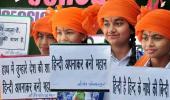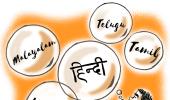'This government has made it compulsory to teach some languages that have died.'
'You can't keep languages alive by making them compulsory.'

"If there are no thought-provoking books, then on what basis will people read and question all that is happening? Then obviously, the University of WhatsApp will be the basis of faith and belief," Ganesh N Devy, thinker and cultural activist, tells Neeta Kolhatkar.
Why isn't the government laying equal emphasis on all languages and instead focusing on just a few languages?
Did your survey reveal any kind of government bias that encourages the spread of only a select few languages?
In 2010, we conducted an independent analysis through the Peoples Linguistic Survey to get a precise understanding of the number of languages that exist, which are 780.
We did this detailed study to understand the languages that are dying and why.
In this survey we learnt those people residing along the coast of India, their languages are disappearing and the languages of nomadic tribes are in pathetic condition.
In 30 years, 400 languages of these 780 will completely die.
Has this government taken steps to help people preserve the spoken languages or can you see certain amount of disdain here?
I did present these studies which run into 50 volumes in 91 books, till now 65 have been published.
The HRD ministry had called me to understand the whole issue, where the then register general of census, unversity grants commission chairman, secretaries and ministers were present.
Now, the government cannot kill any language because it is an extremely democratic form of communication.
People speak and keep it alive or let it die.
Yes, the government has to help create jobs in the local languages and help allied businesses to thrive.
This current government has made it compulsory to teach some languages that have died.
You can't keep languages alive by making them compulsory.
Instead, when the government does economic planning, they have to keep in mind to make effective plans to keep these languages alive, else many Indian languages will die and with it we will lose our cultural diversity.
Do you see a deliberate strategy to not make budgetary allocation and plans to maintain this diversity?
At the meetings I have had with various ministers, the UGC allocated Rs 80 crore (Rs 800 million) and they asked me to allocate the funds across various universities.
Accordingly, I gave a lot of time and energy and distributed funds to nearly 12 central universities which have a high standard.
Unfortunately, after four years I can see that the universities have utilised these funds to construct buildings.
In the last six years, there has been an attempt to alienate certain communities which creative people have been speaking against. Do you see it being on the rise?
If one cannot see it, then we will have to call those citizens either visually impaired or deaf.
Then why is it still being allowed?
I will give you an example.
The publishers in India are nervous because the publishing industry is on the verge of dying.
The reason being the production of all school books have been given to NCRT (the National Council of Educational Research and Training) by the CBSE (the Central Board of Secondary Education).
The publishers -- who have been printing some really thought-provoking books and novels, mainly in Hindi and English, not regional languages -- these publishers till now, depended on publishing school books and in the remaining time, they would publish some intellectual works.
Many of them have begun shutting shop.
This will kill free thought.
If there are no thought-provoking books, then on what basis will people read and question all that is happening?
Then obviously, the University of WhatsApp will be the basis of faith and belief.
This will obviously weaken free thought and the group of critical thinkers that have existed in our country.

Isn't this happening across every sector?
Yes, it is happening.
Look at the mass media, the primary source of providing news and information.
You are either being terrorised or there is strong temptation.
We see often see the combination of both these factors.
As a result, the media is portraying unimportant news which is of no use to society, but is mainly doling out frivolous news.
The press is an important pillar of a democracy and this is its condition.
Imagine the universities, which is the place for critical thinking, even there the government is issuing circulars from time to time, threatening students and professors.
So we are in times where there is no scope for critical thinking in universities, the media is not allowed to question and those who write intellectual discourse or speak about it, that is also being disallowed.
Now is the time every citizen needs to ask are we going to have a highly educated population that can make progress or do we want to become bonded labour of technology?
Those who feel about the discrepancies and injustices are speaking up.
From our youth to women and older people, they are speaking out.
Why aren't the intellectuals speaking up?
There is a deep connect between the influence of writers, intellectuals over society, but the impact cannot be seen instantaneously like Tik 20. It takes time.
People listen to the counter-narrative, they read and think over what is being written.
They have to internalise it, convince within and then discuss to understand the nuances and linkages.
The youth and students of our country, who you call millennials, have started a movement.
Now, five years ago, they were not the same, they would not have taken to the streets to protest, but it is due to some critical thinking they have reached this stage.
Critical thinking takes place over a period of time and if it is serious, it is not restricted to any specific period.
It is not like you press a button and you see the effect in our society.
Though we can say now even that change we can see.
People have brought change in some parts of our country by pressing the button.










